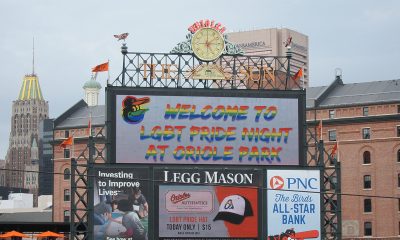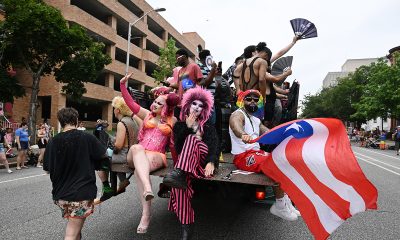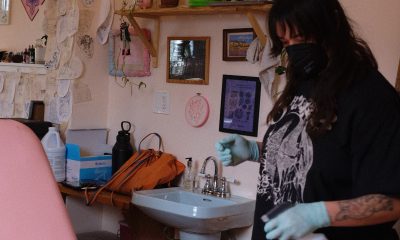a&e features
‘Deep Talk’ with Andy Cohen
‘Real Housewives’ mastermind coming to Baltimore with pal Cooper
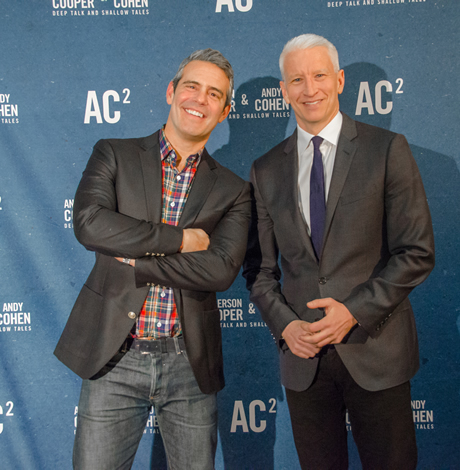
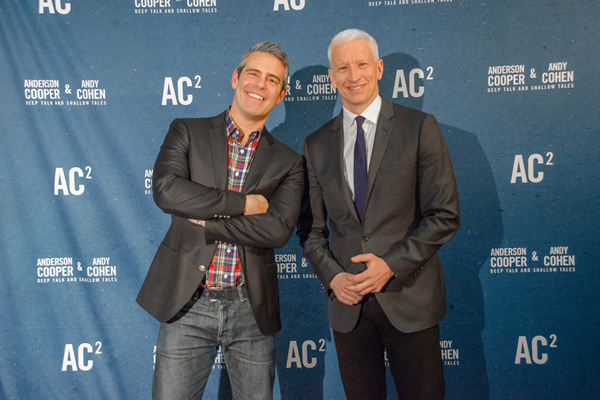
Andy Cohen, left, and Anderson Cooper in their joint show AC2. Cohen says it works because they’re friends in real life. (Photo by Glenn Kulbak)
AC2
An Intimate Evening with Anderson Cooper and Andy Cohen
‘Deep Talk and Shallow Tales’
Hippodrome Theatre
12 N. Eutaw St., Baltimore
Friday, April 28
8 p.m.
Some celebs are witty and fabulous enough, they don’t need a script. They can just get on stage and start gabbing and people eat it up.
Such is the case with gay pals Anderson Cooper (of CNN fame) and Andy Cohen, who almost gives Ryan Seacrest a run for his money in terms of having his hand in the most pop culture pots, with their show “AC2: Deep Talk and Shallow Tales.”
Cohen is an Emmy-winning host of “Watch What Happens: Live” on Bravo late night, executive producer of the “Real Housewives” franchise and a New York Times bestselling author.
The pair were last here in 2015 at the Warner Theatre in Washington. This is the first AC2 show in Baltimore. Cohen spoke to the Blade last week by phone from his home in New York.
WASHINGTON BLADE: What’s your favorite on-stage conversation you’ve ever had with Anderson?
ANDY COHEN: It’s really like going out to a bar with us and just hanging out. Just a night of storytelling and fun conversation. There’s a story in the show that kind of just stayed in the show and we don’t really tell it outside of the show which involves a near-death experience that Anderson had that I was involved in that’s quite shocking and terrifying. I don’t know that that’s my favorite, but it’s certainly one of the more shocking ones.
BLADE: What’s the most outrageous audience question you ever got during one of these?
COHEN: Oh my God, I’ve had someone ask how hung we are. I’ve had people ask if we’re tops or bottoms. We’ve gotten everything.
BLADE: Do you playfully deflect?
COHEN: Well I try to answer everything. Anderson has a little more decorum than I do.
BLADE: Are you ever offended? Nobody would have asked that 30 years ago.
COHEN: Yeah, I know. No, because I like it and think it’s fun. I think people expect me to be open about anything, so I’m OK with it.
BLADE: Do you ever have to steer the tone to keep it from getting to heavy or serious or silly or whatever?
COHEN: We’re pretty good. We vibe it out pretty well with each other. We really just talk to each other and then we open it up towards the last half hour. We keep it on track pretty well.
BLADE: You’re both well versed in both hard news and pop culture. Is that partially why it works?
COHEN: Yeah, I totally think so.
BLADE: How do you coordinate your schedules. You’re both crazy busy.
COHEN: We just book it far, far in advance and pray for the best.
BLADE: Your career path is so unusual from going behind the scenes to being a host and celeb. That would seem like such a different skill set. Is it as unusual as you’d think?
COHEN: It is unusual but it’s been kind of organic and I think that’s why it’s worked. One thing has led to the next, so I don’t question how it happened. I’m thrilled about it.
BLADE: By the time you did get in front of the camera, you were pretty high up. Was it ever scary not getting to make your rookie mistakes on a smaller stage?
COHEN: Not really, no. I think it all happened for a reason.
BLADE: Trump has brought narcissism into the national dialogue in a way we haven’t seen before. Does everyone who signs up for a reality show like “Real Housewives” have some narcissism issues in your experience?
COHEN: Yes, I think absolutely. I think anybody who opens themselves up to that kind of moment, you know, open up their lives in that way in that way I think, for sure. I think all of us who decide to go in front of the camera have some level of narcissism. I don’t know if it’s a bad thing or what.
BLADE: Dealing with a whole cast of those types sounds like a nightmare. Is it?
COHEN: Oh absolutely. That’s why these shows are so successful still. People ask that and it’s because of the casting. People ask if they’re real or not and they’re definitely real. We cast people who are dramatic by nature and I think that’s why the shows are still going.
BLADE: You and Teresa Giudice from “The Real Housewives of New Jersey” were friends at the time she and her husband were sentenced to jail. Was it hard being friends but also covering it for the show?
COHEN: Not really. I think we have good relationships, so yeah.
BLADE: What’s been your favorite moment from one of the reunions?
COHEN: Oh wow. There’s a moment involving a bunny that’s coming up in the Beverly Hills reunion. That was pretty kind of hilarious. That’s coming up in the next couple of weeks.
BLADE: You’ve said Kellyanne Conway would make a great housewife. What would her opening tagline be?
COHEN: (pauses) I think it would be about alternative facts. I think hers would be the only truth that matters are my alternative facts.
BLADE: Are you cool with it if it turns out “Real Housewives” is your legacy?
COHEN: Yeah, I would be OK with that. I was always a big soap opera fan and I think it has replaced the soap opera. I think it’s today’s modern-day version of a soap opera so I think that’s an absolutely fine thing.
BLADE: Does it ever surprise you which cast members end up becoming huge in pop culture?
COHEN: Sometimes. It used to surprise me more but now kind of nothing surprises me. You know, because we’ve been through it so many times.
BLADE: Pop culture is so instant gratification, like junk food. Not to be all Oprah or anything, but you’re so immersed in it, is it a soul drain over time? Do you meditate or anything?
COHEN: Well, I think in the last few years my social life has actually — I’m probably working much more than I was, but I used to go out almost every night after the show so I don’t anymore. I’m still obviously a very social person, but I’m much less so than I was before and I think there’s something — I’m a little more calm now.
BLADE: There must be moments where you just wish everybody would go away.
COHEN: It’s all right. It’s all fun, you know what I mean? I consider myself very blessed. I know it sounds trite or lame or whatever, but it’s good problems to have. I’m sure, by the way, that in a couple years there will be a lot less demand for my services or interest in me and then I’ll have more time.
BLADE: You and Anderson like to egg each other on. Are you ever afraid you’ll say something on TV or stage and suddenly be in really hot water? Like some Natalie Maines moment or something?
COHEN: Yeah, I worry about that all the time and it was a theme in my last book actually. It was just me kind of always wondering if this would be the moment that I would wind up blowing it all.
BLADE: Why did you open “Superficial,” your last book, with the death of Joan Rivers?
COHEN: Because the last book ended right around the time. I took a couple weeks off from writing and it was just the day that I decided to start writing again.
BLADE: You were a little nervous when that book first came out that it would piss people off. How did it play out?
COHEN: It turned out OK. Whoever’s mad at me hasn’t told me they’re mad at me. I’m sure there are people.
BLADE: Any truth to the rumor that Caitlyn Jenner might join the “Real Housewives of Beverly Hills”?
COHEN: Totally not true.
BLADE: Who’s somebody famous whose house you’ve been to that was totally not what you expected?
COHEN: (pauses) I don’t know. Everybody kind of seems to live how I expect them to. If it’s someone rich and fancy, they usually have a rich and fancy house. When I went to Anderson’s many years ago, I was surprised it wasn’t nicer. But now he has a really nice house. But the first apartment of his that I went to, I was like, “This is not —,” you know.
BLADE: He officially came out pretty late but you’ve known him for ages. Did he ever talk to you about if he should come out or not come out?
COHEN: We had some — he was out to all his friends so it didn’t really seem like a big thing.
BLADE: Who’s the most different when the camera’s rolling vs. not?
COHEN: Oh, many people. Well, not really. I don’t want to sell anybody out.
BLADE: But it’s not uncommon for some people to just come alive when it’s on?
COHEN: Well, now that I think about it, no, it’s not really that much different.
BLADE: There was some almost scoffing when Barry Manilow finally made it official that he’s gay a couple weeks ago. Do you think with some celebrities it gets to the point that it’s so long and so widely assumed that it just gets almost ridiculous?
COHEN: Well look, I’m all for everybody coming out. Look, he did it in his own time and he had his own reasons and so, you know, I can’t speculate on someone else’s reasons and what they may be.
a&e features
Visit Cambridge, a ‘beautiful secret’ on Maryland’s Eastern Shore
New organization promotes town’s welcoming vibe, LGBTQ inclusion

CAMBRIDGE, Md. — Driving through this scenic, historic town on Maryland’s Eastern Shore, you’ll be charmed by streets lined with unique shops, restaurants, and beautifully restored Victorian homes. You’ll also be struck by the number of LGBTQ Pride flags flying throughout the town.
The flags are a reassuring signal that everyone is welcome here, despite the town’s location in ruby red Dorchester County, which voted for Donald Trump over Kamala Harris by a lopsided margin. But don’t let that deter you from visiting. A new organization, Proudly Cambridge, is holding its debut Pride event this weekend, touting the town’s welcoming, inclusive culture.
“We stumbled on a beautiful secret and we wanted to help get the word out,” said James Lumalcuri of the effort to create Proudly Cambridge.
The organization celebrates diversity, enhances public spaces, and seeks to uplift all that Cambridge has to share, according to its mission statement, under the tagline “You Belong Here.”
The group has so far held informal movie nights and a picnic and garden party; the launch party is June 28 at the Cambridge Yacht Club, which will feature a Pride celebration and tea dance. The event’s 75 tickets sold out quickly and proceeds benefit DoCo Pride.
“Tickets went faster than we imagined and we’re bummed we can’t welcome everyone who wanted to come,” Lumalcuri said, adding that organizers plan to make “Cheers on the Choptank” an annual event with added capacity next year.
One of the group’s first projects was to distribute free Pride flags to anyone who requested one and the result is a visually striking display of a large number of flags flying all over town. Up next: Proudly Cambridge plans to roll out a program offering affirming businesses rainbow crab stickers to show their inclusiveness and LGBTQ support. The group also wants to engage with potential visitors and homebuyers.
“We want to spread the word outside of Cambridge — in D.C. and Baltimore — who don’t know about Cambridge,” Lumalcuri said. “We want them to come and know we are a safe haven. You can exist here and feel comfortable and supported by neighbors in a way that we didn’t anticipate when we moved here.”

Lumalcuri, 53, a federal government employee, and his husband, Lou Cardenas, 62, a Realtor, purchased a Victorian house in Cambridge in 2021 and embarked on an extensive renovation. The couple also owns a home in Adams Morgan in D.C.
“We saw the opportunity here and wanted to share it with others,” Cardenas said. “There’s lots of housing inventory in the $300-400,000 range … we’re not here to gentrify people out of town because a lot of these homes are just empty and need to be fixed up and we’re happy to be a part of that.”
Lumalcuri was talking with friends one Sunday last year at the gazebo (affectionately known as the “gayzebo” by locals) at the Yacht Club and the idea for Proudly Cambridge was born. The founding board members are Lumalcuri, Corey van Vlymen, Brian Orjuela, Lauren Mross, and Caleb Holland. The group is currently working toward forming a 501(c)3.
“We need visibility and support for those who need it,” Mross said. “We started making lists of what we wanted to do and the five of us ran with it. We started meeting weekly and solidified what we wanted to do.”
Mross, 50, a brand strategist and web designer, moved to Cambridge from Atlanta with her wife three years ago. They knew they wanted to be near the water and farther north and began researching their options when they discovered Cambridge.
“I had not heard of Cambridge but the location seemed perfect,” she said. “I pointed on a map and said this is where we’re going to move.”
The couple packed up, bought a camper trailer and parked it in different campsites but kept coming back to Cambridge.
“I didn’t know how right it was until we moved here,” she said. “It’s the most welcoming place … there’s an energy vortex here – how did so many cool, progressive people end up in one place?”
Corey van Vlymen and his husband live in D.C. and were looking for a second home. They considered Lost River, W.Va., but decided they preferred to be on the water.
“We looked at a map on both sides of the bay and came to Cambridge on a Saturday and bought a house that day,” said van Vlymen, 39, a senior scientist at Booz Allen Hamilton. They’ve owned in Cambridge for two years.
They were drawn to Cambridge due to its location on the water, the affordable housing inventory, and its proximity to D.C.; it’s about an hour and 20 minutes away.
Now, through the work of Proudly Cambridge, they hope to highlight the town’s many attributes to residents and visitors alike.
“Something we all agree on is there’s a perception problem for Cambridge and a lack of awareness,” van Vlymen said. “If you tell someone you’re going to Cambridge, chances are they think, ‘England or Massachusetts?’”
He cited the affordability and the opportunity to save older, historic homes as a big draw for buyers.
“It’s all about celebrating all the things that make Cambridge great,” Mross added. “Our monthly social events are joyful and celebratory.” A recent game night drew about 70 people.
She noted that the goal is not to gentrify the town and push longtime residents out, but to uplift all the people who are already there while welcoming new visitors and future residents.
They also noted that Proudly Cambridge does not seek to supplant existing Pride-focused organizations. Dorchester County Pride organizes countywide Pride events and Delmarva Pride was held in nearby Easton two weeks ago.
“We celebrate all diversity but are gay powered and gay led,” Mross noted.
To learn more about Proudly Cambridge, visit the group on Facebook and Instagram.
What to see and do
Cambridge, located 13 miles up the Choptank River from the Chesapeake Bay, has a population of roughly 15,000. It was settled in 1684 and named for the English university town in 1686. It is home to the Harriet Tubman Museum, mural, and monument. Its proximity to the Blackwater National Wildlife Refuge makes it a popular stop for birders, drawn to more than 27,000 acres of marshland dubbed “the Everglades of the north.”
The refuge is walkable, bikeable, and driveable, making it an accessible attraction for all. There are kayaking and biking tours through Blackwater Adventures (blackwateradventuresmd.com).
Back in town, take a stroll along the water and through historic downtown and admire the architecture. Take in the striking Harriet Tubman mural (424 Race St.). Shop in the many local boutiques, and don’t miss the gay-owned Shorelife Home and Gifts (421 Race St.), filled with stylish coastal décor items.
Stop for breakfast or lunch at Black Water Bakery (429 Race St.), which offers a full compliment of coffee drinks along with a build-your-own mimosa bar and a full menu of creative cocktails.
The Cambridge Yacht Club (1 Mill St.) is always bustling but you need to be a member to get in. Snapper’s on the water is temporarily closed for renovations. RaR Brewing (rarbrewing.com) is popular for craft beers served in an 80-year-old former pool hall and bowling alley. The menu offers burgers, wings, and other bar fare.
For dinner or wine, don’t miss the fantastic Vintage 414 (414 Race St.), which offers lunch, dinner, wine tasting events, specialty foods, and a large selection of wines. The homemade cheddar crackers, inventive flatbreads, and creative desserts (citrus olive oil cake, carrot cake trifle) were a hit on a recent visit.
Also nearby is Ava’s (305 High St.), a regional chain offering outstanding Italian dishes, pizzas, and more.
For something off the beaten path, visit Emily’s Produce (22143 Church Creek Rd.) for its nursery, produce, and prepared meals.
“Ten minutes into the sticks there’s a place called Emily’s Produce, where you can pay $5 and walk through a field and pick sunflowers, blueberries, you can feed the goats … and they have great food,” van Vlymen said.
As for accommodations, there’s the Hyatt Regency Chesapeake Bay (100 Heron Blvd. at Route 50), a resort complex with golf course, spa, and marina. Otherwise, check out Airbnb and VRBO for short-term rentals closer to downtown.
Its proximity to D.C. and Baltimore makes Cambridge an ideal weekend getaway. The large LGBTQ population is welcoming and they are happy to talk up their town and show you around.
“There’s a closeness among the neighbors that I wasn’t feeling in D.C.,” Lumalcuri said. “We look after each other.”
a&e features
James Baldwin bio shows how much of his life is revealed in his work
‘A Love Story’ is first major book on acclaimed author’s life in 30 years

‘Baldwin: A Love Story’
By Nicholas Boggs
c.2025, FSG
$35/704 pages
“Baldwin: A Love Story” is a sympathetic biography, the first major one in 30 years, of acclaimed Black gay writer James Baldwin. Drawing on Baldwin’s fiction, essays, and letters, Nicolas Boggs, a white writer who rediscovered and co-edited a new edition of a long-lost Baldwin book, explores Baldwin’s life and work through focusing on his lovers, mentors, and inspirations.
The book begins with a quick look at Baldwin’s childhood in Harlem, and his difficult relationship with his religious, angry stepfather. Baldwin’s experience with Orilla Miller, a white teacher who encouraged the boy’s writing and took him to plays and movies, even against his father’s wishes, helped shape his life and tempered his feelings toward white people. When Baldwin later joined a church and became a child preacher, though, he felt conflicted between academic success and religious demands, even denouncing Miller at one point. In a fascinating late essay, Baldwin also described his teenage sexual relationship with a mobster, who showed him off in public.
Baldwin’s romantic life was complicated, as he preferred men who were not outwardly gay. Indeed, many would marry women and have children while also involved with Baldwin. Still, they would often remain friends and enabled Baldwin’s work. Lucien Happersberger, who met Baldwin while both were living in Paris, sent him to a Swiss village, where he wrote his first novel, “Go Tell It on the Mountain,” as well as an essay, “Stranger in the Village,” about the oddness of being the first Black person many villagers had ever seen. Baldwin met Turkish actor Engin Cezzar in New York at the Actors’ Studio; Baldwin later spent time in Istanbul with Cezzar and his wife, finishing “Another Country” and directing a controversial play about Turkish prisoners that depicted sexuality and gender.
Baldwin collaborated with French artist Yoran Cazac on a children’s book, which later vanished. Boggs writes of his excitement about coming across this book while a student at Yale and how he later interviewed Cazac and his wife while also republishing the book. Baldwin also had many tumultuous sexual relationships with young men whom he tried to mentor and shape, most of which led to drama and despair.
The book carefully examines Baldwin’s development as a writer. “Go Tell It on the Mountain” draws heavily on his early life, giving subtle signs of the main character John’s sexuality, while “Giovanni’s Room” bravely and openly shows a homosexual relationship, highly controversial at the time. “If Beale Street Could Talk” features a woman as its main character and narrator, the first time Baldwin wrote fully through a woman’s perspective. His essays feel deeply personal, even if they do not reveal everything; Lucian is the unnamed visiting friend in one who the police briefly detained along with Baldwin. He found New York too distracting to write, spending his time there with friends and family or on business. He was close friends with modernist painter Beauford Delaney, also gay, who helped Baldwin see that a Black man could thrive as an artist. Delaney would later move to France, staying near Baldwin’s home.
An epilogue has Boggs writing about encountering Baldwin’s work as one of the few white students in a majority-Black school. It helpfully reminds us that Baldwin connects to all who feel different, no matter their race, sexuality, gender, or class. A well-written, easy-flowing biography, with many excerpts from Baldwin’s writing, it shows how much of his life is revealed in his work. Let’s hope it encourages reading the work, either again or for the first time.
a&e features
Looking back at 50 years of Pride in D.C
Washington Blade’s unique archives chronicle highs, lows of our movement
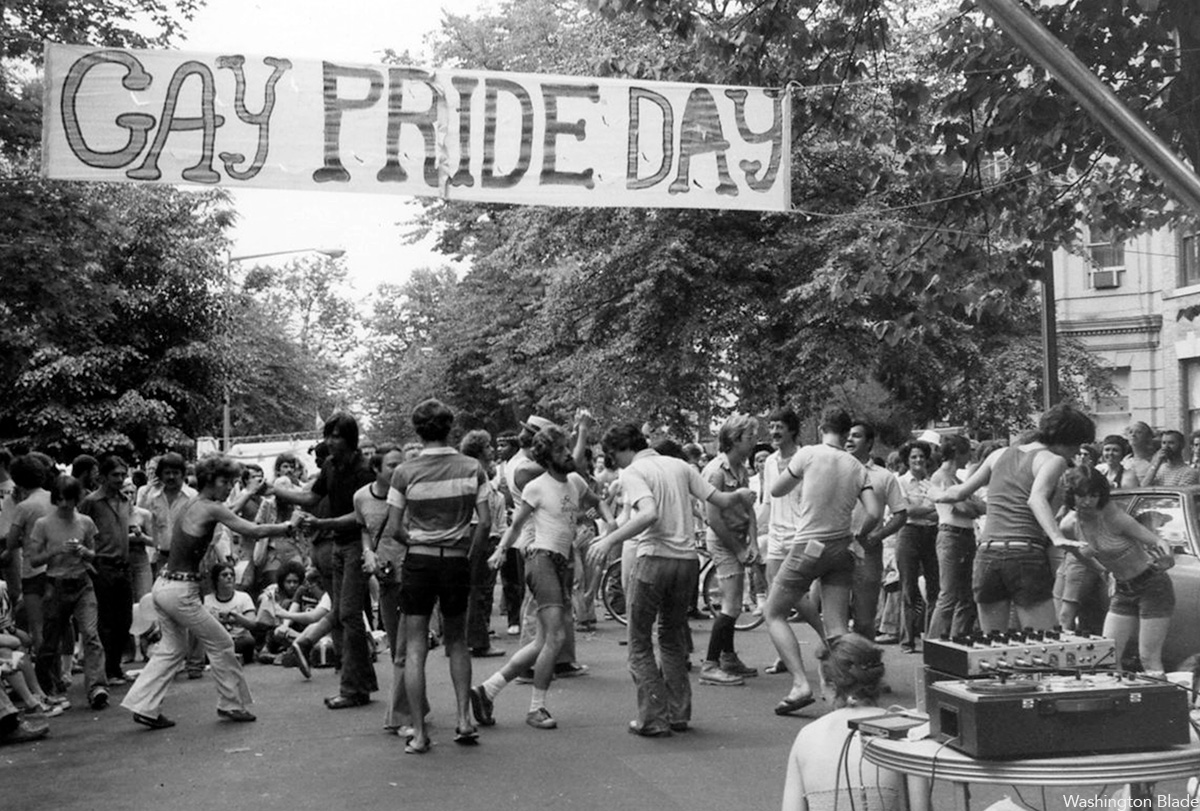
To celebrate the 50th anniversary of LGBTQ Pride in Washington, D.C., the Washington Blade team combed our archives and put together a glossy magazine showcasing five decades of celebrations in the city. Below is a sampling of images from the magazine but be sure to find a print copy starting this week.
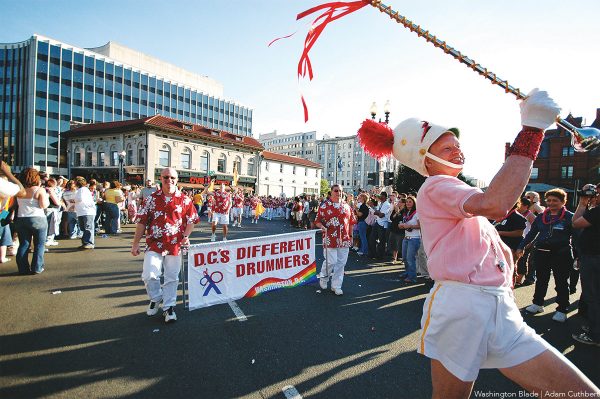
The magazine is being distributed now and is complimentary. You can find copies at LGBTQ bars and restaurants across the city. Or visit the Blade booth at the Pride festival on June 7 and 8 where we will distribute copies.
Thank you to our advertisers and sponsors, whose support has enabled us to distribute the magazine free of charge. And thanks to our dedicated team at the Blade, especially Photo Editor Michael Key, who spent many hours searching the archives for the best images, many of which are unique to the Blade and cannot be found elsewhere. And thanks to our dynamic production team of Meaghan Juba, who designed the magazine, and Phil Rockstroh who managed the process. Stephen Rutgers and Brian Pitts handled sales and marketing and staff writers Lou Chibbaro Jr., Christopher Kane, Michael K. Lavers, Joe Reberkenny along with freelancer and former Blade staffer Joey DiGuglielmo wrote the essays.

The magazine represents more than 50 years of hard work by countless reporters, editors, advertising sales reps, photographers, and other media professionals who have brought you the Washington Blade since 1969.
We hope you enjoy the magazine and keep it as a reminder of all the many ups and downs our local LGBTQ community has experienced over the past 50 years.
I hope you will consider supporting our vital mission by becoming a Blade member today. At a time when reliable, accurate LGBTQ news is more essential than ever, your contribution helps make it possible. With a monthly gift starting at just $7, you’ll ensure that the Blade remains a trusted, free resource for the community — now and for years to come. Click here to help fund LGBTQ journalism.
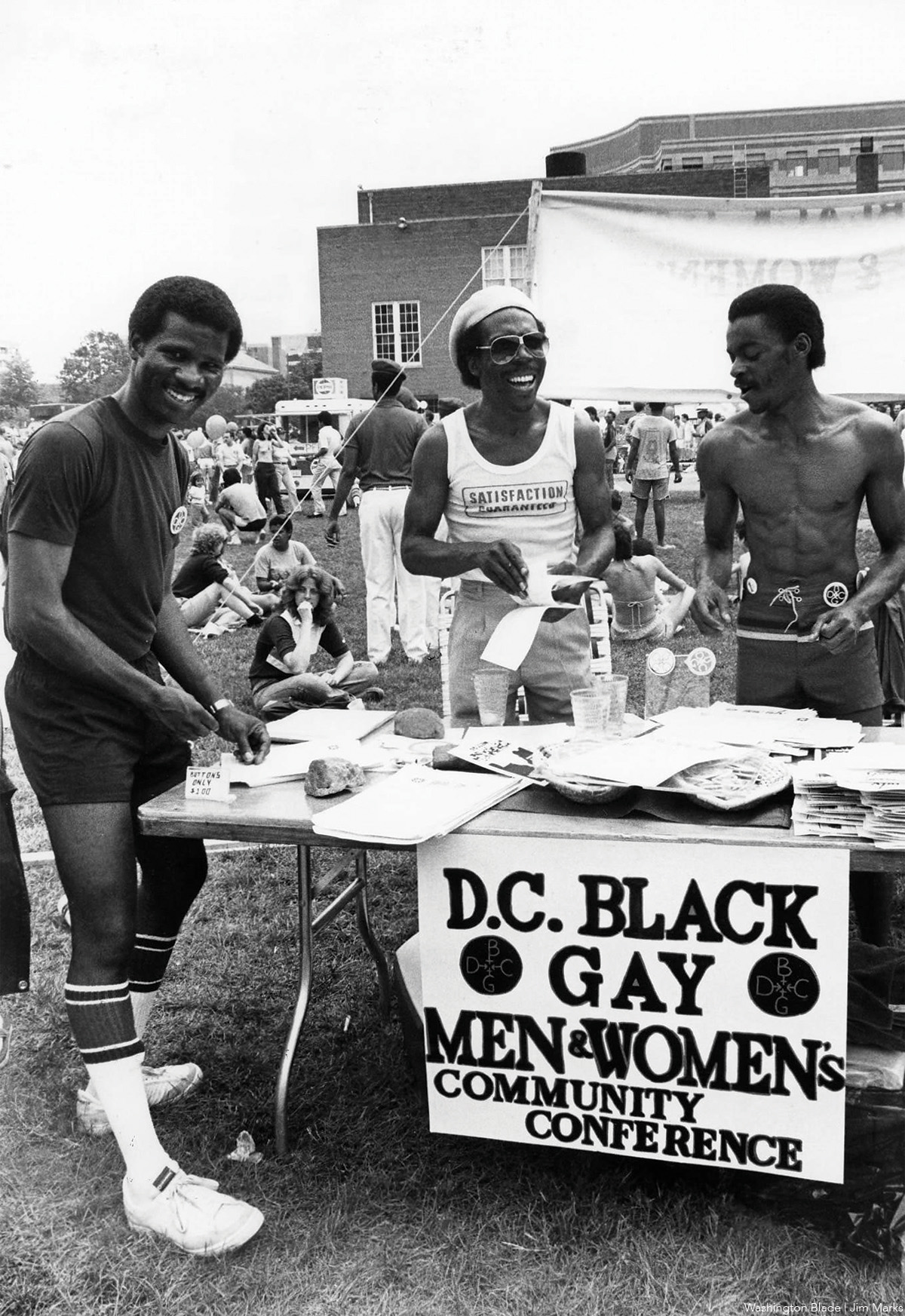
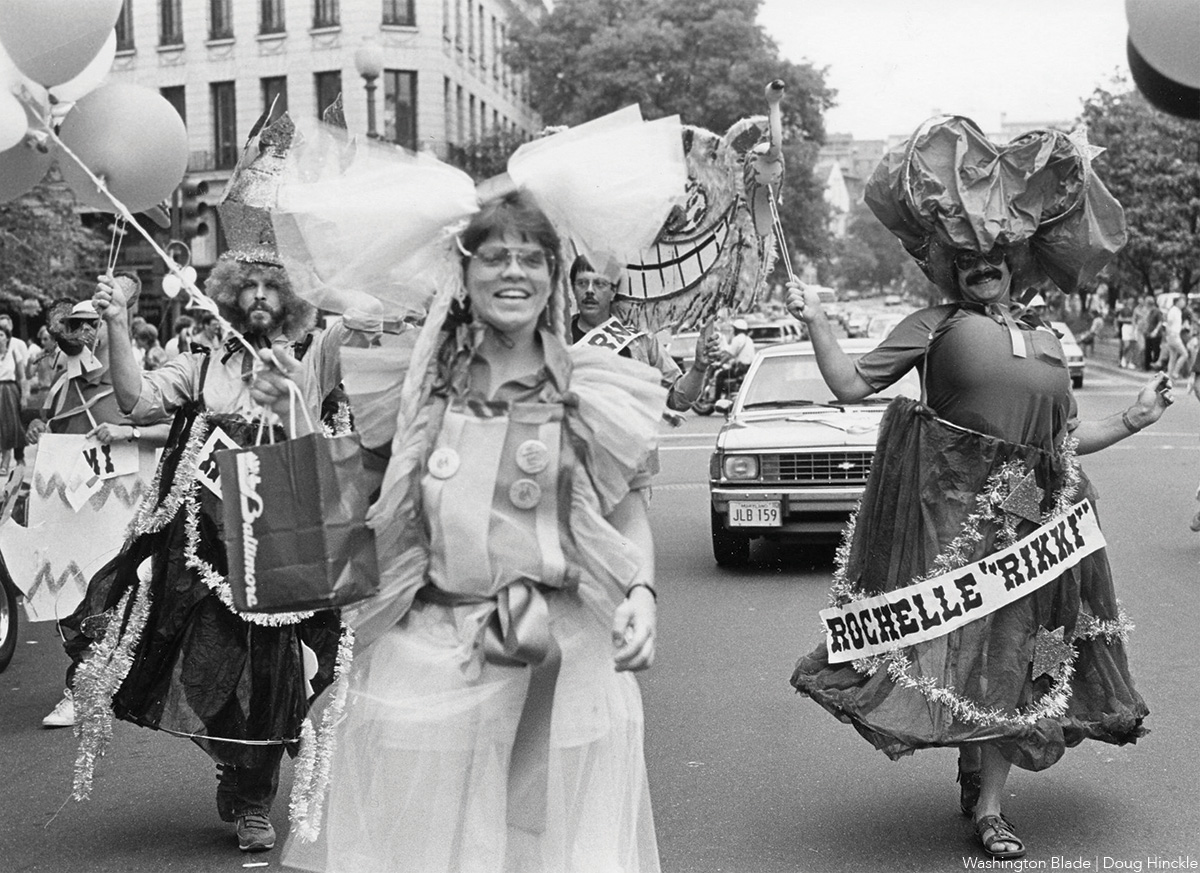

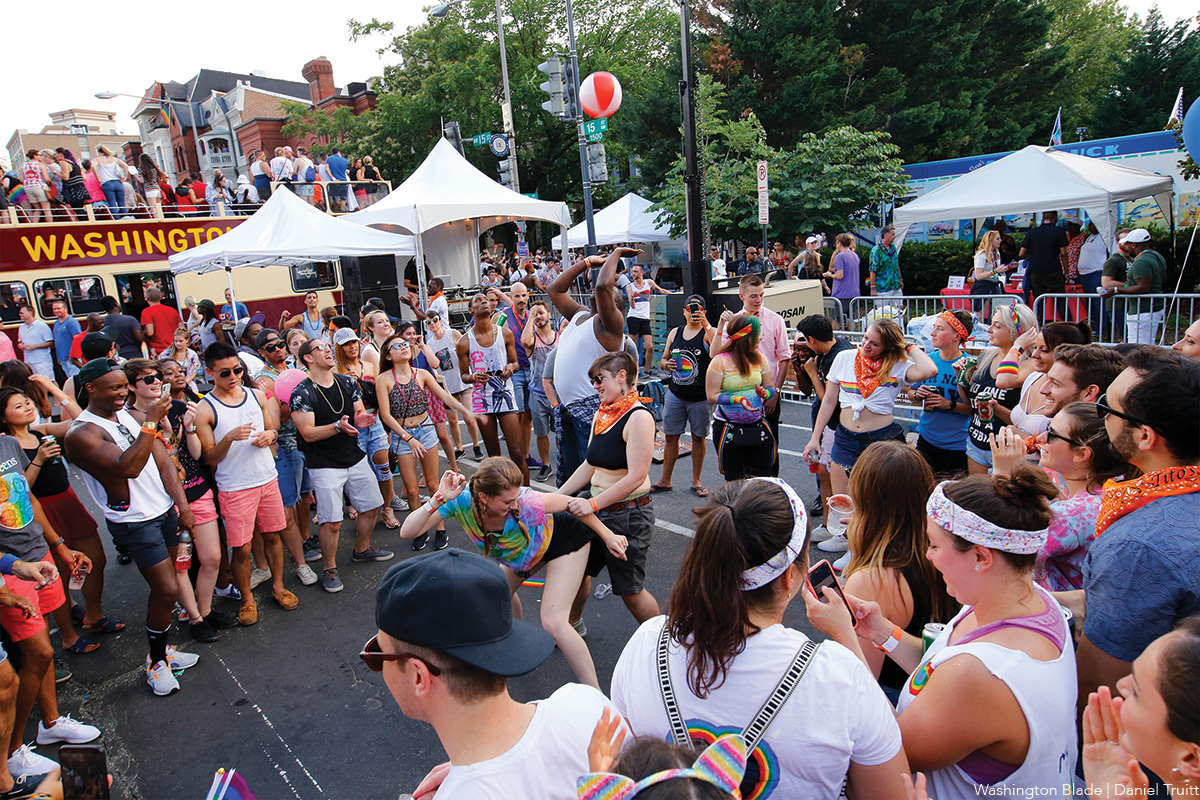
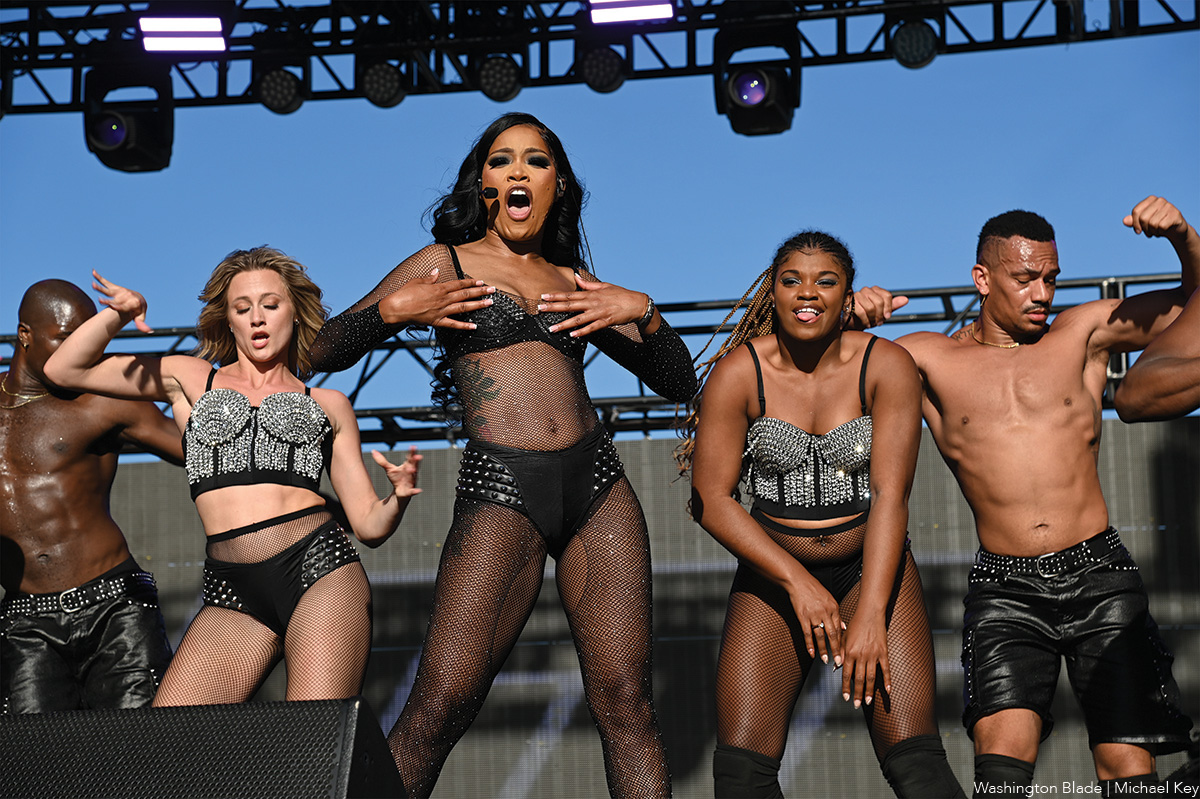
-

 U.S. Supreme Court3 days ago
U.S. Supreme Court3 days agoSupreme Court upholds ACA rule that makes PrEP, other preventative care free
-

 U.S. Supreme Court3 days ago
U.S. Supreme Court3 days agoSupreme Court rules parents must have option to opt children out of LGBTQ-specific lessons
-

 India5 days ago
India5 days agoIndian court rules a transgender woman is a woman
-

 National4 days ago
National4 days agoEvan Wolfson on the 10-year legacy of marriage equality

